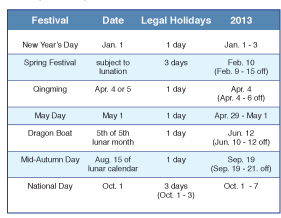By: Richard King

Being the holiday season, it is interesting to compare holiday activities in China and the U.S. China has seven legal holidays in a year, including New Year's Day, Spring Festival, Qingming Festival, May Day, Dragon Boat Festival, Mid-Autumn Day and National Day. The Mid-Autumn Festival, Moon Festival, is a traditional Chinese holiday falling on the 15th day of the 8th month of the Chinese lunar calendar, usually late September. In 2004, this festival was celebrated on 28th of September. On the day of the Moon Festival, the full moon is at the years roundest and brightest, which symbolizes family unity and togetherness.
According to Chinese traditions, on this day family members and friends gather to visit scenic spots, gaze at the moon, and eat mooncakes. Farmers furthermore celebrate the end of the agricultural season and the harvest on this date.
It is one of the two most important holidays in the Chinese calendar (the other being Chinese New Year) and is a legal holiday in several countries.
The traditional Chinese holidays are of Chinese culture associated with Chinese mythology and folklore. They probably originated from ancient farmer rituals for celebrating harvests or prayer offerings. The most important Chinese holiday is the Chinese New Year (Spring Festival), which is also celebrated in Korea, Vietnam, and other Asian countries.
Chinese people legally enjoy over 115 days off including 104 days of weekends and 11 days of festivals. Employees have 5 to 15 days of paid annual leave. Students and teachers have summer and winter vacations for about three months. The table below provides detailed information.
 The civil service such as the government offices, embassies and schools are closed on the legal holidays. Elementary public service establishments like the public transport system run normally to facilitate the locals and tourists on their basic living and travel; however, please note that the banks and post offices only have their major branches opened on holidays. The civil service such as the government offices, embassies and schools are closed on the legal holidays. Elementary public service establishments like the public transport system run normally to facilitate the locals and tourists on their basic living and travel; however, please note that the banks and post offices only have their major branches opened on holidays.
Of course, Chinese holidays lead to massive traffic problems. For the first time in 2012, China’s roads became toll-free, and millions took to their cars as the country’s Mid-Autumn Festival began with traffic jams on major motorways. A decision to grant free road travel meant hundreds of thousands of Chinese drivers spent the first day of the Mid-Autumn Festival in gridlock. When 1.3 billion people all go on holiday at the same time, a little chaos is perhaps to be expected.
Long tailbacks were reported across the country, with 24 major motorways in 16 provinces effectively transformed into enormous parking lots as 86 million people took to the roads, a 13 percent increase over last year.
Frustrated drivers were spotted walking their dogs along the hard shoulder, playing tennis, dropping to the tarmac to do push-ups, or simply snoozing in their cars.
Finally, in order to build on the new spirit of, China will celebrate the 4th of July, American Independence Day, this year. The 4th of July is celebrated with parades, barbeques, and fireworks, which makes it particularly appropriate for adoption in China--more appropriate, in fact, than the already popular Christmas and Valentine's Day.
Marketing professionals confirm that young Chinese people enjoy celebrating Western holidays because they seem more "modern" than traditional Chinese holidays like Qi Qiao Jie (the Chinese "lovers' day"). Western holidays are more commercialized (some were even created in order to sell products), and this fact makes them popular with businesses trying to boost domestic consumption. The practice of "Valentine," for example, has become popular in China and generates revenues for a wide range of businesses, including florists, chocolate makers, jewelers, and restaurants.
So, we may see in the future, Chinese U.S. relations may be greatly influenced by a “national holiday policy”. And the U.S. may begin celebrating Chinese New Year and the autumn festival and make them legal holidays. But, they will not have the right to make the July 4th anthem “Yankee Doodle”.


|